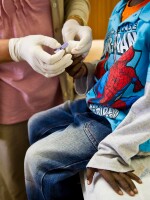Now there's fresh evidence that CT scans to detect early lung cancer belong on the short list of effective cancer screening technologies — at least for people at high risk.
Researchers conclude that spiral CT, which makes 3-D pictures of lungs, could reduce lung cancer deaths by 35 percent at a cost of $19,000 to $26,000 per year of life saved.
By that measure, the CT scans match colonoscopy's record in preventing deaths from colon cancer, the most cost-effective cancer screening tool. It's better than Pap smears for cervical cancer ($50,000 to $75,000 per year of life saved) and mammography screening ($31,000 to $51,000).
The findings appear in this month's Health Affairs.
The authors, a team of actuaries from the consulting firm Milliman and a Chicago lung cancer expert, say health insurers should start covering spiral CT lung cancer screening for people at high risk of lung cancer. Currently the health insurance giant WellPoint is believed to be the only major insurer that does.
It would cost insurers less than a dollar in additional annual premiums for each person they insure, study authors conclude. The cost of lung cancer screening is around $250, which includes the initial CT scan, follow-up scans and biopsies for patients who have something suspicious on the first scan, and smoking cessation counseling.
If all 18 million Americans at high risk of lung cancer got screened, 130,000 would avoid dying of lung cancer, the analysis finds. People at high risk are current and former smokers over 50 who've smoked a pack a day for 30 years or more. That adds up to about a third of Americans between 50 and 64.
More than 150,000 Americans die of lung cancer each year, more than from breast, colon, prostate and cervical cancer combined.
Among lung cancer victims diagnosed after symptoms appear, 84 percent die within five years. But the odds are flipped for those whose cancer is found in the earliest stage before symptoms appear. Ninety percent of those people will be alive five years later.
That's the rationale for lung cancer screening. But the idea has been controversial because the CT screening finds many abnormalities that turn out not to be lung cancer. Those false alarms require follow-up scans and sometimes biopsies of lung tissue, adding cost and anxiety. Also, some experts have questioned whether all lung cancers found by screening would go on to cause disease and death.
To guard against those downsides, advocates (including the authors of the Health Affairs analysis) say lung cancer screening should be paid for only at centers that follow best practices and have reasonable costs.
For instance, doctors who read the scans should be experienced, and they should follow prescribed protocols that minimize unnecessary follow-up tests. For instance,doctors would monitor the growth of suspicious spots before jumping to biopsy.
The researchers note that CT lung screening has improved recently, and biopsies can be done with minimally invasive surgery instead of opening the chest.
The study was done before publication in late 2010 of the large National Lung Screening Trial, which found a 20 percent lower lung cancer death rate among nearly 27,000 who got CT screening compared to an equal number who received conventional chest X-rays.
Milliman's Bruce Pyenson told Shots that his group's results are valid even though they predate the NLST results. He points out that the NLST was stopped when the mortality difference reached 20 percent, but there's reason to think it would have approached the 35 percent reduction that his group's analysis came up with.
Copyright 2020 NPR. To see more, visit https://www.npr.org.



